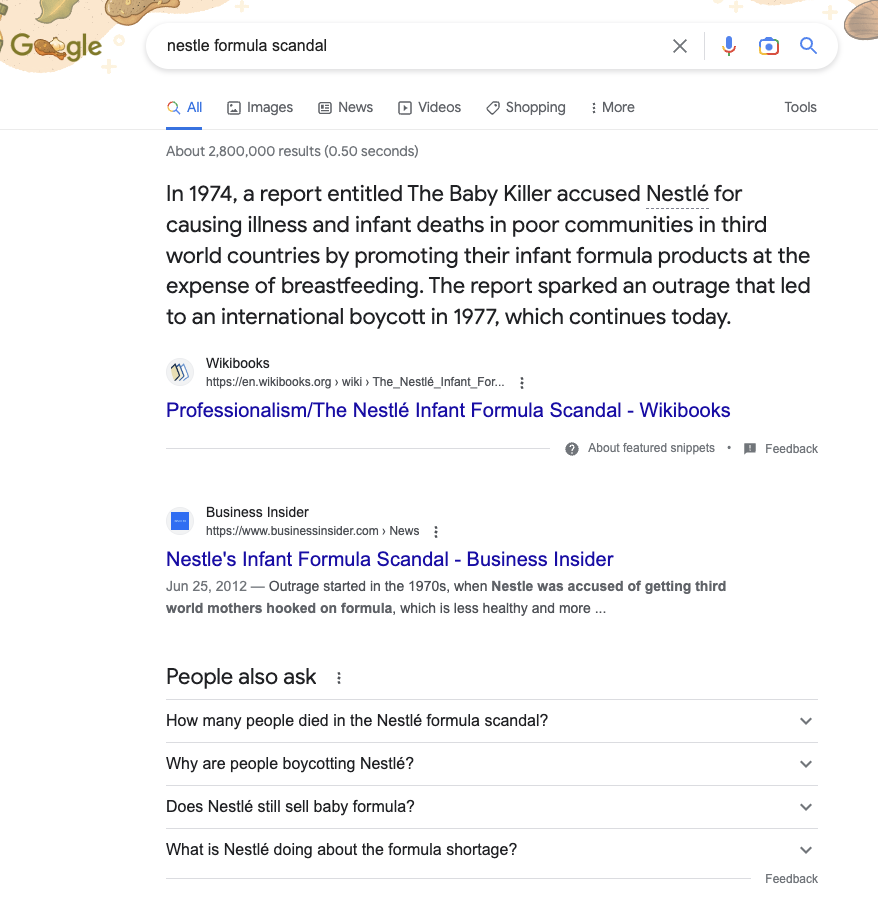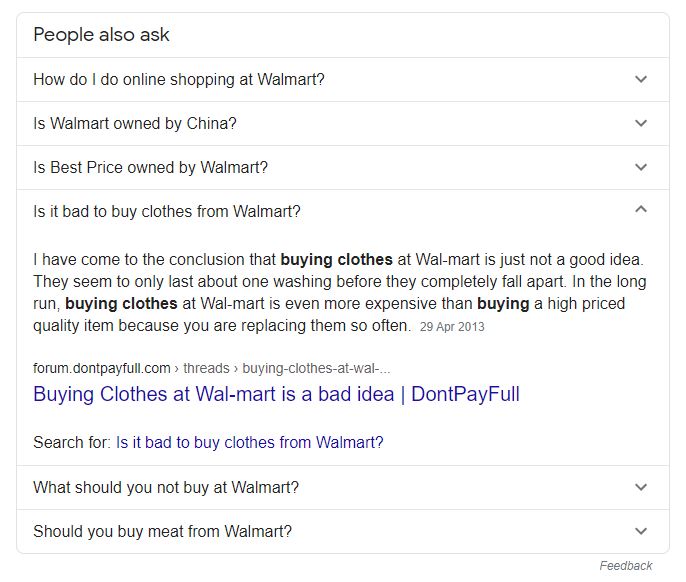All forms of marketing play a part in good brand management.
Using the same tone of voice throughout your ads and emails and choosing the same photo assets for your website as your billboards contribute to the picture painted when a customer considers your product or service.
Sometimes, however, your brand might be in receipt of some negative press or reviews that can alter the way it is seen.
If a potential customer wants to know if your business is reputable, they will likely search for you online.
Visiting your website isn’t enough; they’ll want more objective feedback.
So, online reputation management is critical.
It is the process of shaping and controlling the narrative around your brand online.
SEO is an important step to consider in that process.
What Is Reputation Management In SEO?
Reputation management in SEO is all about ensuring that wherever a searcher encounters their brand in the search engine results pages (SERPs), they take away a positive message about it.
This often means ensuring that the brand influences the front page of the SERPs and the articles pushed in Discover feeds, as well as the News results.
Why Is Reputation Management Important For SEO?
Online reputation management (ORM) is critical for SEO because, no matter how good a website ranks, if the perception of its brand is negative, it will struggle to get clicks.
SEO professionals must stay aware of how the brand they are working on is perceived elsewhere on the internet.
If there is negative sentiment about the brand, it is unlikely that a good call to action in a page title will be enough to get a click.
It’s also important to realize that organic traffic that doesn’t convert will not be very valuable.
A brand’s online reputation can have a huge impact on conversions.
Research into a brand, product, or service often begins online with a search.
Your website will likely only be one or two of the results brought up when someone searches for your brand.
All those other search results will potentially say something about your brand that might not be as favorable as you would like.
For Corporate Brands
Negative reviews happen.
Unfavorable comparisons between your product and a competitor can be made by an objective third party.
Bad press can be high-ranking.
If you aren’t actively monitoring what appears at the top of the search results for your branded keywords then you could be missing out on the opportunity to spot potential reputation issues.
Once a news story starts circulating about your company, or even incorrect information is added to a third-party website, it can be hard to repair the damage to your brand.
It is important that your brand’s message is what’s seen on the first page of the SERPs.
Proactively working on your online reputation management can put you in a strong position to correct misinformation or outrank unfavorable content.
Don’t Forget Your Personal Brand
This all applies to your personal brand as well as your corporate one.
You need to ensure that the information available online paints a positive picture.
We’re all getting very good at portraying ourselves positively on social media.
Photoshopping images, curating our life highlights, and only sharing information that paints us positively.
Employers and recruiters are increasingly visiting social media profiles when considering candidates for a job.
But what about when someone searches your name? What comes up on the first page of the SERPs?
How Does SEO Support Online Reputation Management?
SEO and online reputation management go hand in hand.
Oftentimes, a search engine will be the first encounter a potential new customer will have with a brand.
For ORM to be successful, a brand needs to control what is displayed in the search engines when a user searches for something related to that brand.
That’s where SEO comes in. SEO strategy often focuses on ensuring we are maximizing the value of the real estate available on the SERPs.
Verifying Facts And Displacing Rumors
ORM is all about owning and managing a brand’s reputation online. That reputation can be discussed anywhere online and often on social media.
SEO is still important here because if someone reads a discussion that impacts a brand’s reputation, they may turn to a search engine for further research into the validity of the claims.
For example, Nestle is often the subject of heated discussions around the ethics of large corporations.
Start typing [Nestle formula] into Google, and you may find the following autocomplete suggestion:
 Screenshot from search for [Nestle formula], Google, February 2023
Screenshot from search for [Nestle formula], Google, February 2023 Screenshot from search for [Nestle formula scandal], Google, March 2023
Screenshot from search for [Nestle formula scandal], Google, March 2023They could either create a page that directly addresses the scandal, or they could influence the message of the results by giving quotes for the already ranking articles.
Recovering From A Negative Review
We’ve all had it: Our usually pristine Google Business Profile 5-star review score was marred by a totally unfair 1-star review.
No matter how unfair you believe the review to be, it needs addressing.
Getting The Negative Reviews Removed
Sometimes, the job of the SEO is to get the review removed if it is genuinely unjustified; for example, it contravenes the review system guidelines.
For Google, this might be that a direct competitor or a disgruntled employee left the review.
For sites like TrustPilot, it might be because the reviewer cannot be identified, and therefore, the review might not be based on a genuine experience of the product or service.
Replying To The Review
Sometimes, the job of an SEO is to address a reviewer’s misunderstanding.
Other times, it is better just to hold your hands up and address the complaints that were raised honestly.
This can show that a business listens to feedback and makes positive changes to prevent similar issues from happening again.
I won’t tell you how to get your website to rank for your brand term, just that you need to. That can be particularly tricky if your brand name is a word that means something in your or another language.
It can be especially difficult if your brand name isn’t that unique.
You do want to be ranked as close to position one as possible for your brand name, however. This way, the first result (excluding paid results) for your brand name is a property that you control.
That said, you want positions two, three, four, and five to be properties you own, too.
6 Search Engine Reputation Management Tips
1. Control The Front Page
Wherever possible, the first five or so top-ranking results for your brand should be controlled by you – your website, any other digital properties you host, and your social media pages.
If a potential customer is looking for information on your brand you want to maintain the information they read. This means taking advantage of the prominent social media sites in your region.
Set up branded Facebook, LinkedIn, and Twitter profiles. These social media sites are hugely authoritative and will rank highly for most branded search queries.
Don’t just settle for a social media presence, though.
Set your company up with a profile on review and industry comparison sites, essentially any property outside of your direct ownership that you can still have some say over the content of.
2. Be Active On Social Media & Review Sites
Setting yourself up on social media and review sites does come with risk.
People will comment, and reviews will be left. They will not all be favorable.
However, even if you do not have an official Twitter handle or a company-created Glassdoor page doesn’t mean competitors or disgruntled employees won’t be talking about your company anyway.
You might just have less visibility of it.
Make sure you are responding to comments – positive and negative.
A negative Twitter comment might be returned in a Google search for your brand.
Keep your company active on social media and review sites both to address any negative comments and to keep them off the front page of Google.
3. Set Up A Google Business Profile
This is another area of the branded search results you can own.
Your Google Business Profile listing could be the first result a user sees when searching for your brand.
Around festive holidays, or even during the COVID-19 restrictions, your opening hours or the availability of your office might change.
Google Business Profiles are the perfect place to keep that information updated.
If you don’t have a Google Business Profile listing, searching for “[your brand] opening hours” might pull information from a website that hasn’t been updated.
Google Posts
Another benefit to a Google Business Profile for reputation management is Google Posts.
Posts are small snippets of content that will appear directly on your Google Business Profile listing.
 Screenshot from mobile search for [ZSL London Zoo], Google, February 2023
Screenshot from mobile search for [ZSL London Zoo], Google, February 2023If you need some reactive PR or want to promote something quickly, this is an effective way to do that.
Reviews
A Google Business Profile listing does bring with it the potential for reviews of your brand to appear at the top of the SERPs.
If a user leaves a review on your Google Business Profile there is little that can be done to remove it.
It would need to contravene Google’s review guidelines in some way, and even then, there is no guarantee Google will rule it as such.
Good reputation management is about effectively dealing with negative attention as much as positive.
A negative review can be responded to on Google Business Profile, allowing your brand to turn a negative experience into a positive one.
Questions & Answers
Google Business Profiles also feature a Q&A section where the public can submit questions to your listing.
The main issue with this is the public can also answer those questions. This is a good opportunity to understand your target audience’s interest, but it is a very public way to find out.
It is crucial that you stay on top of any questions asked so you can ensure the answer is accurate.
There is nothing to stop a well-meaning (or ill-intending) member of the public from answering a question and answering it wrong.
Ensure you manage your online reputation well by keeping an eye on this corner of the SERPs.
4. Create Content Around Potentially Negative Keywords
Brand searches often yield a series of People Also Asked (PAA) search prompts.
The PAA results are a goldmine of information for your reputation management keyword analysis. These prompts can cause searches to consider questions about the brand they may never have asked.
For instance, since I’m based in the U.K., I have little exposure or understanding of the brand Walmart.
However, searching the keyword “Walmart” produces these PAAs.
 Screenshot from search for [Walmart], Google, February 2023
Screenshot from search for [Walmart], Google, February 2023I do now.
The question “Is it bad to buy clothes from Walmart?” is off-putting for someone who doesn’t know much about the store, and the search result it features is even worse.
Other common PAAs that will appear for brand searches include “Is [brand] legit?,” “is [brand] a scam?,” and “Can I cancel [brand] subscription?”
Your potential customer might not have any reason to consider your brand a scam, but seeing those questions that others have searched may raise that concern.
Check the PAAs that appear for your brand. If they are even slightly negative you need to ensure you are ranking as the featured snippet for them to counter that notion.
5. Be Newsworthy For The Right Reasons
If you are trying to bury a high-ranking negative news article that is grounded in fact, many will have little sympathy for you.
Instead, work on being newsworthy for the right reasons.
Gain press about your charitable giving, your encouragement of local teams, or your work to protect the environment.
Focus on digital PR for PR’s sake, even if all you get is a brand mention.
If it is on a high authority website, it might be enough to outrank review sites, comparison sites, and other more dangerous properties for your brand terms.
The key is stacking the front page with positive commentary on your brand beyond the properties you have direct control over.
Set Up A Brand Alert
Using Google Alerts or other brand mention monitoring tools, keep an eye out for when you’re mentioned online.
It may be that a journalist or reviewer will be amenable to hearing your side of a negative story.
It might simply be that your company opening hours have been misreported or other inaccuracies stated.
That alert could give you the opportunity to correct misinformation or damaging accusation before it is too widely read.
6. It’s Not All About Google
Don’t forget that there are other search engines aside from Google. Make sure you are following these steps for those search engines, too.
Set up a Bing Places listing and monitor the first page of DuckDuckGo for your brand phrases.
If there is the potential for your brand to be searched in a different search engine, it is critical that you manage your reputation there.
Conclusion
It is absolutely imperative that you consider online reputation management as part of your SEO strategy. It’s also critical that brand marketers understand the important part that SEO plays in brand perception.
SEO and ORM must work hand-in-hand. Otherwise, the time and effort spent on both could go to waste.
Make sure you are factoring both of these into your ongoing marketing strategy.
More Resources:
- What Is Online Reputation Management (ORM)?
- 12 of the Best Tools to Monitor Your Online Reputation
- Local SEO: The Definitive Guide to Improve Your Local Search Rankings
Featured Image: The Sense Production/Shutterstock




